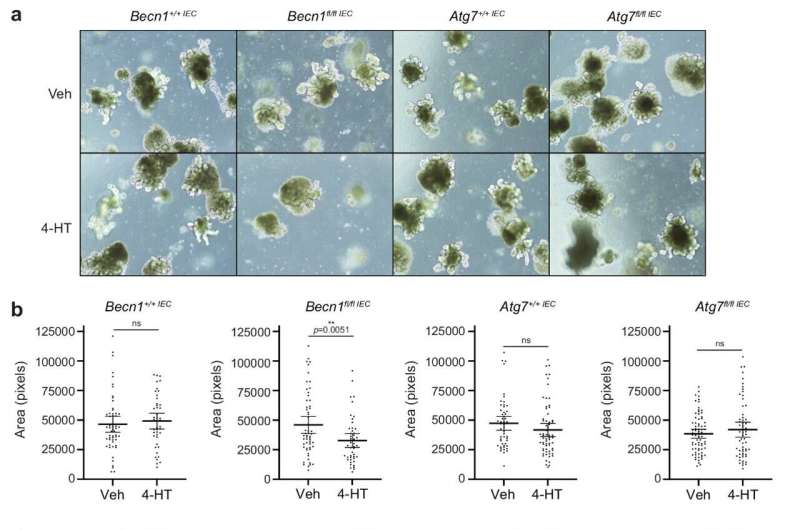This article has been reviewed according to Science X's editorial process and policies. Editors have highlighted the following attributes while ensuring the content's credibility:
fact-checked
trusted source
proofread
Researchers identify protein integral to gut health, may lead to treatments for inflammatory bowel disease

La Trobe University researchers have identified a protein that is integral to gut health, providing an important lead in the search for a treatment for people with inflammatory bowel disease (IBD). Research published in Communications Biology shows for the first time that in mice, the removal of the protein BECLIN1 causes a condition with similarities to IBD.
The study shows that removing BECLIN1 causes problems in the internal "trafficking" pathways of the epithelial cells which line the intestine, leading to a disruption of the protective barrier the cells create.
This disruption can allow bacteria to enter the intestinal wall, which in turn causes the extensive inflammation associated with IBD.
The research opens new possibilities for investigation into new treatment avenues for the disease, which currently affects more than 100,000 people in Australia alone.
Lead researchers Associate Professor Erinna Lee and Associate Professor Doug Fairlie, from the La Trobe Institute for Molecular Science (LIMS) and the Olivia Newton-John Cancer Research Institute (ONJCRI), said this is the first time BECLIN1 has been implicated as a potential factor in IBD, which includes conditions such as Crohn's Disease and Ulcerative Colitis.
"We have shown that removing this particular protein causes significant problems with the normal functioning and survival of the epithelial cells that line our gut and keep us healthy by fighting bacteria and ensuring nutrient absorption," Associate Professor Lee said.
This research also demonstrates the essential role BECLIN1 plays in endocytic trafficking.
"This was unexpected, as BECLIN1 is best known for its involvement in another cellular process called autophagy that does have a known and strong connection with IBD," Associate Professor Fairlie said.
Endocytic trafficking ensures proper functioning by moving the cell's internal elements, known as "cargo," to the right place at the right time.
In this study, another protein called E-CADHERIN, was identified as being an important cargo that relies on BECLIN1 for its correct localization within the cell.
"This makes sense because E-CADHERIN is essential for enabling epithelial cells to stick together. If E-CADHERIN is not located correctly within the cell, then the epithelial barrier lining the gut breaks down and bacteria can penetrate the intestinal tissue, leading to a potent inflammatory response," Associate Professor Fairlie said.
Current treatments for IBD are only able to address the disease's symptoms by reducing inflammation and treating infection, but this study could open the way for the development new treatment options.
"We believe our discovery of BECLIN1 as a master regulator of gut health provides an important new target for further investigation into how to tackle the root causes of IBD and perhaps develop new treatments for the disease," Associate Professor Lee said.
More information: Sharon Tran et al, BECLIN1 is essential for intestinal homeostasis involving autophagy-independent mechanisms through its function in endocytic trafficking, Communications Biology (2024). DOI: 10.1038/s42003-024-05890-7



















